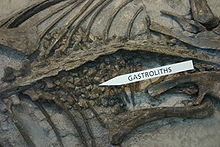- Gastrolith
-
Gastrolithen oder Magensteine sind harte Objekte im Verdauungstrakt von Tieren. Im engeren Sinne bezeichnen Gastrolithen Steine, die von Wirbeltieren verschluckt wurden und sich im Magen befinden oder befanden. Der Name Gastrolith stammt von den griechischen Wörtern γαστήρ gaster (Bauch oder Magen) und λίθος lithos (Stein).
Unter heute lebenden Tieren ist das Verhalten, Steine zu verschlucken (Lithophagie), vor allem von Vögeln, Krokodilen und Robben bekannt. Man kennt Fossilien von Dinosauriern wie den Sauropoden oder anderen Reptilien wie den Tangasauriden aus dem Perm, fossilen Krokodilen und Plesiosauriern, bei denen sich im Bauchbereich des Skelettes Magensteine finden.
Die Funktion der Steine ist bisher nur bei pflanzenfressenden (herbivoren) Vögeln vollständig geklärt. Bei ihnen dienen die verschluckten Steinchen, die auch als „Grit“ oder „Waidkörner“ bezeichnet werden, im Muskelmagen (Ventriculus) zur Zerkleinerung der Nahrung. Bei im Wasser lebenden (aquatischen) Tieren, die keinen sehr muskulösen Magen besitzen, wird diskutiert, ob Magensteine auch als Ballast dienen könnten. Vielleicht sind die meisten Steine auch nur versehentlich mit der Nahrung verschluckt worden.
Als „Gastrolithen“ werden auch im Inneren von Krebstieren gebildete kalkige Mineralkrusten oder Konkretionen, so genannte Krebsaugen, bezeichnet, die als Zwischenspeicher für die bei der Häutung benötigten Mineralstoffe dienen.
In der Veterinärmedizin versteht man unter dem Begriff pathologische, also krankhafte, Konkretionen, die aus Nahrungsresten und Magensäften im Magen von pflanzenfressenden Säugetieren entstanden sind. Diese Objekte werden auch Bezoare genannt.
Weiterführende Literatur
- Heiner Meininghaus; Krebsaugenschüsserl und ähnliche Behältnisse, Weltkunst 70. Jahrgang Nr.8, Aug 2000, Seite 1366/7
- Wings, O. (2007) A review of gastrolith function with implications for fossil vertebrates and a revised classification.- Acta Palaeontologica Polonica, 52 (1): 1-16. [1]
- Wings, O. & Sander, P.M. (2007) No gastric mill in sauropod dinosaurs: new evidence from analysis of gastrolith mass and function in ostriches.- Proceedings of the Royal Society B: Biological Sciences, v. 274 (1610): 635–640. [2]
Weblinks
Wikimedia Foundation.



